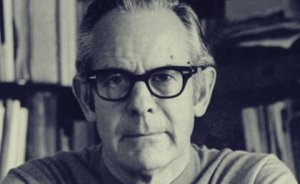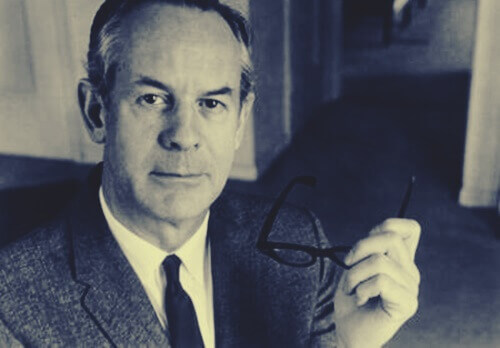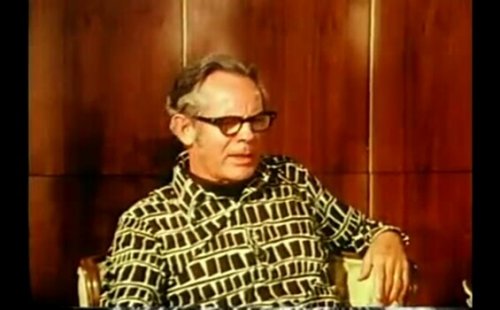Rollo May: The Father of Existential Psychology


Written and verified by the psychologist Valeria Sabater
In the world of psychology, Rollo May was a complete innovator. Among other things, he allowed people to better understand the adverse experiences of human beings. He and other figures, such as Viktor Frankl, endowed psychotherapy with that much needed existential and humanistic approach from which the therapist favors the individual’s strengths, internal resources, and abilities to make better decisions.
Rollo May’s mindset was revolutionary, to say the least. His best-known works, such as The Meaning of Anxiety, Love and Will, or The Courage to Create, are valuable and revealing examples of this. In fact, he questioned many of Sigmund Freud’s ideas and psychoanalysis as a whole.
Rollo May helped thousands of people find enough courage within themselves to face their fears and limitations. In addition to this, he assisted them in exercising their freedom so that they could get to where they wanted to be and fulfill their purpose. He knew just how to appreciate beauty even in the most adverse situations, as well as the intrinsic power that all difficulties carry. May, with his pieces of work, offered a new way of seeing human beings and the world.
“The purpose of psychotherapy is to set people free.”
-Rollo May-
The search for meaning

Rollo May was born in Ada, Ohio, in 1909. His childhood wasn’t easy. He was the oldest of six siblings in a broken family. His parents were divorced. For this reason, it was common for all of the siblings to spend much of the day alone, taking care of each other. This wasn’t easy on any of them, since one of the sisters had schizophrenia.
After graduating from high school, May decided to temporarily leave his environment behind. He went to Greece to work and proceeded to take advantage of this time to do research on philosophy and mythology. However, he had to go back to the United States to look after his siblings. However, those acquired knowledge and the experiences he had in Greece planted more doubts than answers in him. For this reason, he decided to go to New York to study theology.
There, he had a very specific goal in mind: understanding the reasoning behind human suffering. Besides that, he also wanted to learn why mental illnesses existed and why people suffered from fear, anxiety, and suicidal thoughts. To his surprise, then, he met someone who marked his life and his work: the Protestant theologian and existentialist philosopher Paul Tillich.
Rollo May and the influences on his psychological approach
In 1939, while studying theology at university, he wrote his first book, The Art of Counseling. In this piece of work, he first addressed aspects such as empathy, religion, personality problems, and mental health. Later, after getting his degree, he began a new stage by enrolling at Columbia University to study clinical psychology.
During these years, his work was interrupted by tuberculosis. This was a difficult time where, once again, he couldn’t shake off those doubts that led him to need to understand the reason for suffering and daily adversity. He understood that he had two missions as a researcher and as a therapist. For one, to help people give meaning to their lives and, secondly, to help them overcome difficulties by enhancing their potential.

May’s theoretical approach is based on a wide range of currents which helped him give rise to a new perspective of psychology. Let’s see what those are.
- Psychoanalyst and colleague of Sigmund Freud, Otto Rank, was key in his work. Not a lot of people know about his involvement in psychoanalysis. However, he made psychology a newer and more existentialist and humanistic current.
- Humanistic psychologists, such as Abraham Maslow, were also great references for him. However, May was more interested in delving into humans’ difficulties more than needs.
- Finally, another essential figure in his theoretical legacy was Erich Fromm and, specifically, his works on self-expression and free will.
The legacy of Rollo May, an existentialist psychologist
After receiving his doctorate from Columbia University, May began working as a counselor, psychotherapist, and professor at the New School for Social Research in New York. He also taught at Harvard, Yale, and Princeton.
Now, if he’s known for something, it’s for the works he developed. Undoubtedly, they had great significance both in the academic community and in the society of the time. All around the world, people acclaimed works such as Man’s Search for Himself, Love and Will, The Meaning of Anxiety, and The Courage to Create.
The American Psychological Association (APA) honored him for his contributions to clinical psychology. He was a highly prized figure since he helped understand the existential dilemma present in the modern man. Furthermore, he spent his last years in Tiburon (San Francisco Bay). In fact, that’s where he died in October 1994, at the age of 85.

Rollo May’s contributions to psychology
- He introduced existentialism into psychology. This perspective makes use of a positive approach that emphasizes human beings’ capacities and aspirations. At the same time, however, it recognizes his limitations.
- He helped people around the world understand the underlying mechanisms of human suffering and crisis. He did it by combining existentialism with humanism.
- Rollo May focused much of his work on the study of anxiety. Thanks to this, individuals are now able to see it from a different perspective; as a catalyst that helps them make better decisions.
In brief, Rollo May marked the opening of dialogue-based psychotherapy. Its purpose is to provide the patient with strategies to face life in a safer, braver, and more rational way, rather than making them believe it’s directly leading them to well-being and happiness.
“If you do not express your own original ideas, if you do not listen to your own being, you will have betrayed yourself.”
-Rollo May-
In the world of psychology, Rollo May was a complete innovator. Among other things, he allowed people to better understand the adverse experiences of human beings. He and other figures, such as Viktor Frankl, endowed psychotherapy with that much needed existential and humanistic approach from which the therapist favors the individual’s strengths, internal resources, and abilities to make better decisions.
Rollo May’s mindset was revolutionary, to say the least. His best-known works, such as The Meaning of Anxiety, Love and Will, or The Courage to Create, are valuable and revealing examples of this. In fact, he questioned many of Sigmund Freud’s ideas and psychoanalysis as a whole.
Rollo May helped thousands of people find enough courage within themselves to face their fears and limitations. In addition to this, he assisted them in exercising their freedom so that they could get to where they wanted to be and fulfill their purpose. He knew just how to appreciate beauty even in the most adverse situations, as well as the intrinsic power that all difficulties carry. May, with his pieces of work, offered a new way of seeing human beings and the world.
“The purpose of psychotherapy is to set people free.”
-Rollo May-
The search for meaning

Rollo May was born in Ada, Ohio, in 1909. His childhood wasn’t easy. He was the oldest of six siblings in a broken family. His parents were divorced. For this reason, it was common for all of the siblings to spend much of the day alone, taking care of each other. This wasn’t easy on any of them, since one of the sisters had schizophrenia.
After graduating from high school, May decided to temporarily leave his environment behind. He went to Greece to work and proceeded to take advantage of this time to do research on philosophy and mythology. However, he had to go back to the United States to look after his siblings. However, those acquired knowledge and the experiences he had in Greece planted more doubts than answers in him. For this reason, he decided to go to New York to study theology.
There, he had a very specific goal in mind: understanding the reasoning behind human suffering. Besides that, he also wanted to learn why mental illnesses existed and why people suffered from fear, anxiety, and suicidal thoughts. To his surprise, then, he met someone who marked his life and his work: the Protestant theologian and existentialist philosopher Paul Tillich.
Rollo May and the influences on his psychological approach
In 1939, while studying theology at university, he wrote his first book, The Art of Counseling. In this piece of work, he first addressed aspects such as empathy, religion, personality problems, and mental health. Later, after getting his degree, he began a new stage by enrolling at Columbia University to study clinical psychology.
During these years, his work was interrupted by tuberculosis. This was a difficult time where, once again, he couldn’t shake off those doubts that led him to need to understand the reason for suffering and daily adversity. He understood that he had two missions as a researcher and as a therapist. For one, to help people give meaning to their lives and, secondly, to help them overcome difficulties by enhancing their potential.

May’s theoretical approach is based on a wide range of currents which helped him give rise to a new perspective of psychology. Let’s see what those are.
- Psychoanalyst and colleague of Sigmund Freud, Otto Rank, was key in his work. Not a lot of people know about his involvement in psychoanalysis. However, he made psychology a newer and more existentialist and humanistic current.
- Humanistic psychologists, such as Abraham Maslow, were also great references for him. However, May was more interested in delving into humans’ difficulties more than needs.
- Finally, another essential figure in his theoretical legacy was Erich Fromm and, specifically, his works on self-expression and free will.
The legacy of Rollo May, an existentialist psychologist
After receiving his doctorate from Columbia University, May began working as a counselor, psychotherapist, and professor at the New School for Social Research in New York. He also taught at Harvard, Yale, and Princeton.
Now, if he’s known for something, it’s for the works he developed. Undoubtedly, they had great significance both in the academic community and in the society of the time. All around the world, people acclaimed works such as Man’s Search for Himself, Love and Will, The Meaning of Anxiety, and The Courage to Create.
The American Psychological Association (APA) honored him for his contributions to clinical psychology. He was a highly prized figure since he helped understand the existential dilemma present in the modern man. Furthermore, he spent his last years in Tiburon (San Francisco Bay). In fact, that’s where he died in October 1994, at the age of 85.

Rollo May’s contributions to psychology
- He introduced existentialism into psychology. This perspective makes use of a positive approach that emphasizes human beings’ capacities and aspirations. At the same time, however, it recognizes his limitations.
- He helped people around the world understand the underlying mechanisms of human suffering and crisis. He did it by combining existentialism with humanism.
- Rollo May focused much of his work on the study of anxiety. Thanks to this, individuals are now able to see it from a different perspective; as a catalyst that helps them make better decisions.
In brief, Rollo May marked the opening of dialogue-based psychotherapy. Its purpose is to provide the patient with strategies to face life in a safer, braver, and more rational way, rather than making them believe it’s directly leading them to well-being and happiness.
“If you do not express your own original ideas, if you do not listen to your own being, you will have betrayed yourself.”
-Rollo May-
All cited sources were thoroughly reviewed by our team to ensure their quality, reliability, currency, and validity. The bibliography of this article was considered reliable and of academic or scientific accuracy.
- May, Rollo (2015) Amor y voluntad. Madrid: Gedisa
- May, R. (2000). Dilema del Hombre. Gedisa.
- May, Rollo. (Octubre 2009) Rollo May sobre Terapia Existencial. Volumen 49 Número 4. Revista de Psicología Humanística. 419-434.
This text is provided for informational purposes only and does not replace consultation with a professional. If in doubt, consult your specialist.







